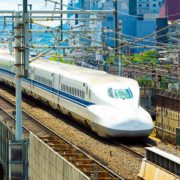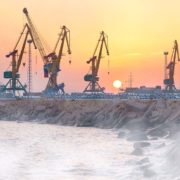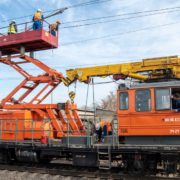Economics, Environment, Information and Communications Technology, Infrastructure, Social development and protection, Urban development
 Climate change, Environment, Social development and protection
Climate change, Environment, Social development and protection
 Energy, Environment, Governance and public sector management, Transport
Energy, Environment, Governance and public sector management, Transport
 Climate change, Economics, Energy
Climate change, Economics, Energy
 Economics, Infrastructure, Social development and protection, Transport
Economics, Infrastructure, Social development and protection, Transport
 Climate change, Economics, Environment
Climate change, Economics, Environment
 Economics, Industry and trade, Subjects, Transport
Economics, Industry and trade, Subjects, Transport
 Economics, Environment, Health, Industry and trade, Social development and protection, Uncategorized
Economics, Environment, Health, Industry and trade, Social development and protection, Uncategorized
 Economics, Industry and trade, Private sector development, Subjects, Transport
Economics, Industry and trade, Private sector development, Subjects, Transport
 Climate change, Finance sector development, Subjects
Climate change, Finance sector development, Subjects

Levelling up innovation in Asia

Innovation is playing a vital role in the economic, social, and environmental progress of Asia and the Pacific and has been an important factor in the region's rapid and successful transformation. However, many countries in the region lag behind, innovating at a fraction of the pace as countries in similar or even lower income groups.
Circularity of plastics: From managing waste to generating less waste

With urbanization and the growing global population, much focus has been placed on finding solutions for improving solid waste management as a way to curb the growing amounts of waste being generated. However, governments should instead look at the root cause of the issue and shift toward exploring ways to generate less waste.
The next steps for meeting nationally determined contributions after COP26

Reductions in emissions of carbon dioxide and other greenhouse gases (GHG) must be achieved in the coming decades to avoid catastrophic global temperature rises. Limiting global warming to within 1.5°C will require rapid, far-reaching, and unprecedented changes in all sectors. GHG emissions in Asia and the Pacific now account for over 50% of the world’s total.
Carbon pricing’s potential to reduce emissions in Australia offers lessons for Asia

The COP26 summit in Glasgow in November 2021 brought the global community together to accelerate action toward meeting the goals of the Paris Agreement and the United Nations Framework Convention on Climate Change (UNFCCC). However, achieving these goals will not be possible without effective carbon pricing.
Balancing the Spillover Effects of High-Speed Rail Infrastructure Investment in Asia

Comprehensive infrastructure projects have proven to be efficient in reducing poverty, community burdens, and production costs and raising competitiveness within and between regions. However, investment in specific forms of infrastructure can help balance the trade-offs between huge infrastructure demand and scarce financial resources, especially in developing countries.
After COP26, developing Asia’s challenge is meeting ambitious climate commitments

Developing Asian countries, such as Indonesia, Kazakhstan, Thailand, and Viet Nam, have announced their net-zero carbon emission targets by mid-century at the United Nations Climate Change Conference (COP26) in Glasgow, Scotland, and financing climate change mitigation has been at the forefront of discussions for making ambitious climate action a reality.
Infrastructure investment key to unlocking emerging Asia-Europe trade corridor

Spanning from the People’s Republic of China through Central Asian countries along the Caspian Sea to Europe, the Trans-Caspian Corridor is an increasingly important channel for transportation and cross-border trade. Considerable financing gaps and other challenges must be addressed to meet its rapidly expanding infrastructure needs.
COVID-19’s impact in Asia shapes blueprint for sustainable economic recovery

The economic impact of the coronavirus disease (COVID-19) pandemic in Asia highlights the importance of entrenching longer-term sustainability and economic resilience into the recovery process. The macroeconomic effects of the pandemic, as well as the impact on firms and households in Asia, are featured in a new ADBI edited book, COVID-19 Impacts and Policy Options: An Asian Perspective.
Infrastructure investment to spur firm performance in Central Asia

Effective infrastructure projects not only construct infrastructure, such as roads, railways, water supply, and electricity, but can boost economic growth in the surrounding region through “spillover effects” (Yoshino, Azhgaliyeva, and Mishra 2021). The infrastructure benefits firms by lowering costs and improving connectivity and the ease of doing business, leading to greater sales and exports.
COP26-aligned fiscal policy instruments for boosting Asian green growth, sustainable recovery
By Nella Sri Hendriyetty, Jacqueline Cottrell, Alexander Boden and Misuzu Nakamura. Posted October 5, 2021

The final months of 2021 will be a crucial time for climate policy. At the United Nations Climate Change Conference (COP26) in Glasgow from 31 October to 12 November, countries will need to come forward and show that they take the commitments that they made in Paris seriously and that they will reduce GHG emissions such that we reach net zero by 2050 to meet the climate targets of the Paris Agreement. Carbon pricing and other fiscal policies will play a critical role.


Search
Subscribe / Connect to Asia Pathways
Subjects
- Accelerating Progress in Gender Equality
- Addressing Remaining Poverty and Reducing Inequality
- Agriculture and natural resources
- Capacity development
- Climate change
- Economics
- Education
- Energy
- Environment
- Finance and Innovation
- Finance sector development
- Gender
- Globalization and Economic Stability
- Globalization, Environment, and Climate Change
- Governance and public sector management
- Health
- Human Capital Development for Inclusive Growth and Shared Prosperity
- Industry and trade
- Information and Communications Technology
- Infrastructure
- Making Cities More Livable
- Miscellaneous
- Population
- Poverty
- Private sector development
- Promoting Rural Development and Food Security
- Regional cooperation and integration
- Sanitation
- Social development and protection
- Strengthening Governance and Institutional Capacity
- Subjects
- Tackling Climate Change, Building Climate and Disaster Resilience, and Enhancing Environmental Sustainability
- Transport
- Uncategorized
- Urban development
- Video Blog
- Water
Recent Posts
- Preparing for LDC Graduation: Sustaining Development and Integration amid Changing Trade Schemes
- Facing the Heat: Addressing the Health Impacts of Extreme Temperatures
- Harnessing Energy Transition to Power Rural Development and Female Empowerment
- The Promise and Perils of Mother Tongue-Based Education
- From Crisis to Resilience: The Evolution of the Banking Sector in Asia and the Pacific




Recent Comments